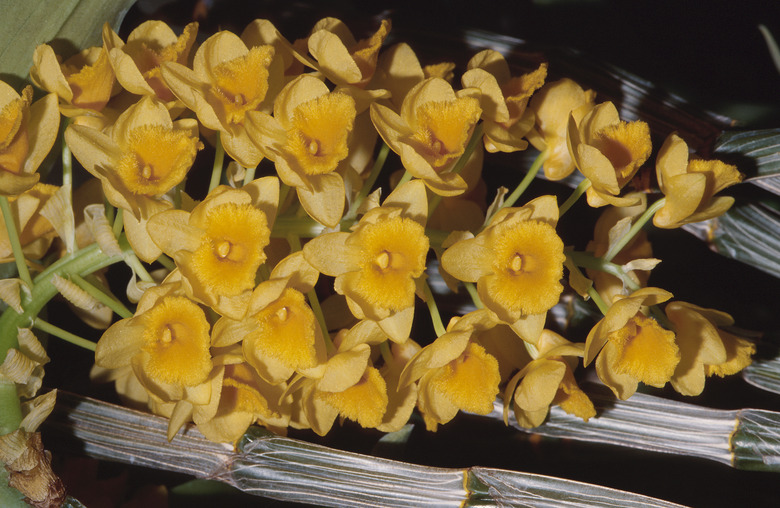Honeysuckle Toxicity
Honeysuckles (Lonicera spp.) are part of the genus Lonicera, which includes about 180 species of shrubs and vines that are prized for their showy, fragrant blooms. They're widely cultivated in the United States, used in border plantings, hedges and groundcover. However, some varieties of honeysuckle are mildly toxic, and care should be taken when planting them in gardens where children or pets play.
Poisonous Varieties
Step 1
While most honeysuckle species are not poisonous, some varieties contain glycosides in the stems or vines, and carotenoids in the berries. These are generally only mildly toxic in humans, but can be harmful to animals and small children. Japanese honeysuckle (Lonicera japonica), which is native to Asia and hardy to U.S. Department of Agriculture plant hardiness zones 4a to 9b, contains these toxic compounds. According to the University of Georgia, trumpet honeysuckle (Lonicera sempervirens), which is hardy to zones 3 through 9, and native to the Southeastern United States, is also mildly toxic, as are some bush varieties. Asia natives Amur honeysuckle (Lonicera maackii), hardy to zones 3 through 8; and morrow honeysuckle (Lonicera morrowii), hardy to zones 4 through 8; Russia and Turkey native tatarian honeysuckle (Lonicera tatarica), which is hardy to zones 3 through 8; and European fly honeysuckle, also known as European mound (Lonicera xylosteum), hardy to zones 4 through 6, are all mildly poisonous as well.
- Honeysuckles (Lonicera spp.)
- According to the University of Georgia, trumpet honeysuckle (Lonicera sempervirens), which is hardy to zones 3 through 9, and native to the Southeastern United States, is also mildly toxic, as are some bush varieties.
Confusion Over Toxicity
Step 1
Honeysuckle plants don't affect all wildlife. They're a source of food for birds and don't appear to affect some wild animals, such as rodents and most horses. Gardeners may be confused as to whether or not honeysuckles are safe to plant because of this, and because honeysuckles aren't flagged in many poison control systems as a poisonous plant. However, some poisonous plant resources, like the University of Georgia, the Ladybird Johnson Wildflower Center, and Ohio State University, do confirm that certain honeysuckle varieties contain toxic compounds that can be harmful in large quantities.
Symptoms of Poisoning
Step 1
Ingesting any part of toxic varieties of honeysuckle plants can cause several negative effects. Symptoms of poisoning by honeysuckle include stomach pain, diarrhea, irregular heartbeat and vomiting. These effects are usually mild and occur only when large quantities are ingested. However, some humans or animals may experience severe reactions to honeysuckle plants, and in these cases respiratory failure, convulsions or coma is possible.
- Honeysuckle plants don't affect all wildlife.
- However, some poisonous plant resources, like the University of Georgia, the Ladybird Johnson Wildflower Center, and Ohio State University, do confirm that certain honeysuckle varieties contain toxic compounds that can be harmful in large quantities.
If Poisoning Occurs
Step 1
While honeysuckle is not considered highly toxic, if you or a pet has ingested any part of poisonous varieties in large enough amounts, serious illness can occur. If symptoms of poisoning are present, do not induce vomiting. Instead, remove all plant parts from the mouth or hands and rinse with water. Contact your local emergency service or the National Poison Control Center at 1-800-222-1222. Due to the risk of life-threatening reactions, seek medical attention even if you're not sure that poisoning has occurred.
References
- Fine Gardening: Genus Lonicera
- Ladybird Johnson Wildflower Center: Digestive Distress from Eating Lonicera Sempervirens
- Ohio State University Extension: Bush Honeysuckle
- University of Georgia Cooperative Extension: Poisonous Plants in the Landscape
- Bachman's: Poison Plants List
- Missouri Botanical Garden: Lonicera Xylosteum
- Missouri Botanical Garden: Lonicera Maackii
- Missouri Botanical Garden: Lonicera Morrowii
- Missouri Botanical Garden: Lonicera Tatarica 'Alba'
